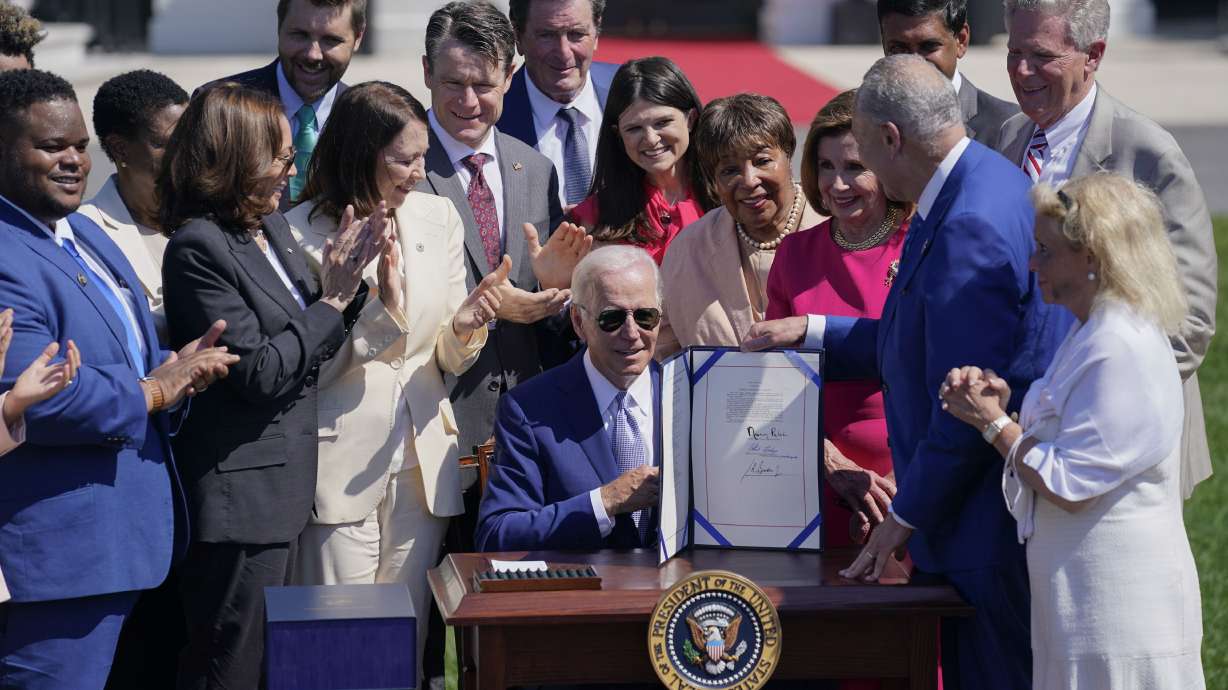Estimated read time: 4-5 minutes
This archived news story is available only for your personal, non-commercial use. Information in the story may be outdated or superseded by additional information. Reading or replaying the story in its archived form does not constitute a republication of the story.
SALT LAKE CITY — President Joe Biden gathered with congressional and business leaders Tuesday on the South Lawn of the White House to sign a massive, $280 billion bipartisan-supported bill aiming to reignite a U.S. microchip industry that's lost ground in a market now dominated by Asian manufacturers.
Biden said the bill was a "once in a generation investment" that "supercharges our efforts to make semiconductors here in America" as the microchip industry that was dominated by U.S.-based research and innovation has since mostly migrated to Taiwan, South Korea and China.
"We face an inflection point in our nation and around the world," Biden said. "Fundamental change is taking place today, politically, economically and technologically. Change that can either strengthen our sense of control and security … or change that weakens us.
"This is the moment we face."
The CHIPS (Creating Helpful Incentives to Produce Semiconductors) plus Science Act earned bipartisan support in both its U.S. House and Senate votes, ending a journey that Senate Majority Leader Chuck Schumer said began some three years ago in collaboration with his Republican colleague, Indiana Sen. Todd Young.
The proposal found almost universal support among congressional Democrats and gathered enough GOP votes, 17 in the Senate and 24 in the House, to advance the bill to a president looking for a much-needed domestic policy win ahead of the November midterm elections.
Schumer described the bill as the best way to secure future U.S. leadership in science and innovation industries and lauded its bipartisan passage, a legislative occurrence that has become increasingly rare in Washington politics.
"I've always said Democrats would be ready to work with Republicans when possible and, with today's signing, we celebrate such an accomplishment," Schumer said.
The legislation provides more than $52 billion in grants and other incentives for the semiconductor industry as well as a 25% tax credit for those companies that invest in chip plants in the U.S. It also calls for increased spending on various research programs that would total about $200 billion over 10 years, according to the Congressional Budget Office.
Biden said the funding comes with "guardrail" stipulations that keep the money from flowing to things like corporate stock buybacks or dividend checks and boosts U.S. investment in technology research and development by almost 1% of the national gross domestic product, returning to levels not seen in some 70 years.
Related:
The president said the funding attached to the bill will lead to 40,000 new technology jobs and boost the U.S. market share in memory chips by 500%.
Currently, Asian nations control more than 80% of global microchip market share. But parsed by country of origin, Taiwan is the undisputed world leader when it comes to chips, accounting for some 63% of the market, with South Korea at 18% and China about 6%. While U.S.-based manufacturers had 37% of the microchip market in 1990, it's now down to 12%.
At a China-focused summit hosted by World Trade Center Utah and Utah Valley University in June, experts noted the country has made no secret about its commitment to building up its own microchip infrastructure and is investing billions of dollars in incentives and giveaways to rapidly grow its slice of the global market.
During a summit discussion, Sarah Kemp, vice president for international government affairs at Intel, noted domestic microchip manufacturing capacity has evolved into a significant geopolitical issue.
"At this particular moment in time, economic security is national security and, around the world, people have realized that means chips," Kemp said. "This tiny little thing the size of a postage stamp and as thin as one strand of hair, that has over 30 billion components to it, drives everything you do."
While the Asian microchip powerhouses have built their market positions with significant government-backed support, Kemp noted a new wave of nations is looking to emulate that success. Now, a growing number of national governments are engaging in programs to support their own expansions in chip manufacturing capacity.
"What steel and railroads were in the 1900s, chips … are right now," Kemp said. "It's the next big leap in economic vitality. And every country in the world wants to get in on that game."
Republicans argued the government should not spend billions to subsidize the semiconductor industry and GOP leadership in the House recommended a vote against the bill, telling members the plan would provide enormous subsidies and tax credits "to a specific industry that does not need additional government handouts."
That stance also reflected the sentiment of Utah Sen. Mike Lee who, unlike his GOP colleague Sen. Mitt Romney, voted against the CHIPS bill. Romney lauded the legislation as a means for the U.S. to remain competitive with China.
In a statement shared on Twitter, Lee said the CHIPS funding amounted to providing industry-specific "corporate welfare" and would result in leaving the U.S. microchip industry and American consumers "poorer and less competitive."
My statement on the CHIPS Act: pic.twitter.com/AlbHa7FFjo
— Mike Lee (@SenMikeLee) July 27, 2022
"Instead of focusing on the supply chain crisis broadly, Congress has opted to play favorites with big industry and powerful lobbyists," Lee wrote in his tweet. "Spending $75 billion in corporate welfare while Americans are suffering under historic inflation is as irresponsible as it is offensive.
"Time will show that entrenching powerful legacy corporations with billions of dollars will only make the American chip industry and the American people poorer and less competitive."











